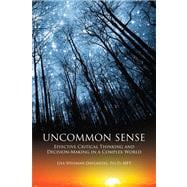Presented as a supplemental text focusing on practical applications, Uncommon Sense embodies an innovative approach in discussing the roots of and lifelong influences on critical thinking. In today’s technology-driven, need-answers-now world, students and laypeople alike will benefit from the study of various psychological theories of human functioning and their effects on our ability to make effective decisions in all areas of our lives.
This text offers a comprehensive balance in combination with theory-laden critical thinking texts, demonstrating how to put principles into action in our everyday encounters with self and others.








